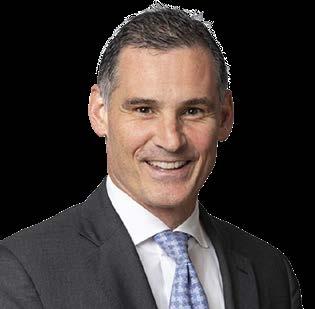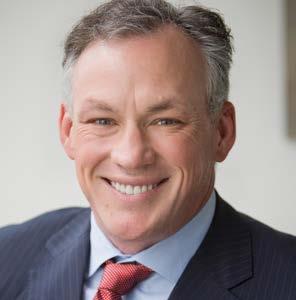
6 minute read
What is the biggest challenge facing the PE industry as we move into 2021?
NILS RODE Chief Investment Officer, Schroder Adveq Looking ahead, investors face very diverse prospects across the major economies. Investors need to take into account multiple variables, including demographic developments, changing global trading relationships and economic stimulus (or lack of it) in forming an investment strategy. Private equity has the flexibility to generate returns in different types of environments, given a broad range of return drivers. These range from consolidation strategies – with buy-and-build investments in lower growth economies – to growth investments in younger, privately held firms in higher growth parts of the world. Additionally, innovation-based strategies with venture capital funding play a role in all types of macroeconomic environments, due to their relative independence from economic and financial market developments.
A key risk factor that investors should look out for arises from the increasing investor interest in the asset class. This trend can lead to strong inflows of capital into certain segments of the market, which in turn may have a negative effect on future return expectations. As more and more investors are willing to accept and are even actively seeking illiquidity, it is safe to assume that the “illiquidity premium” is decreasing, even though this is hard to measure.
What is becoming ever-more important therefore is what we call the “complexity premium”. This means that investors are rewarded for making investments that are difficult to find, identify and to access. They are fundamentally transformed during the holding period based on special skills, networks and resources and, at time of exit, are attractive and accessible to a wide group of potential acquirers or investors. Examples include: small buyouts, emerging managers, co-underwriting for direct/co-investments, specialised secondaries, turnaround, seed and early-stage technology and biotechnology investments, early growth investments in Asia and Chinese onshore RMB investments. JARED BARLOW Partner, Kline Hill Partners The biggest challenge for the PE industry in 2021 will be to make sense of lofty valuations and finding proprietary transactions considering the significant amount of private capital pursuing transactions. And doing so while the economy continues to struggle with an uncharted pandemic landscape and while broader geopolitical risks remain.
The Covid-19 disruption in 2020 was unexpected and resulted in an initial freeze in private market deal making, but transaction activity and valuation multiples are springing back to pre-Covid levels quickly. PE and VC firms still face significant competition seeking out differentiated transactions at reasonable price points. Deal activity in 2020 has been relatively muted and as a result there is increasing pressure on PE and VC managers to deploy capital. If the economy is recovering, then undoubtedly deal activity will rise in 2021, and potentially tremendously so. But finding attractively priced targets at historically high valuation levels will be difficult. Are valuations in this environment reflective of the risk being taken by these companies given broader market uncertainties?
Our view at Kline Hill is that “small is beautiful” when it comes to beating market returns and managing macro risk. Differentiated returns will be found in hand-picked and prudently diligenced smaller transactions that are off the radar of larger auction processes and where leverage and valuation are moderate.


DAVE TAYEH Head of Private Equity, North America, Investcorp The story from 2020 required resilience amidst unprecedented disruption from the pandemic, including the steepest recession since the Great Depression. In the spring, GPs primarily focused on managing existing portfolios through the immediate shock and the industry has successfully adapted to operating in this new environment.
Since then, we’ve seen a resurgence in sentiment and deal making. The rapid and aggressive actions from central banks have supported the markets but have also boosted valuations, even relative to pre-pandemic multiples that were already at historic highs. The key question and challenge for 2021 will be how GPs position themselves and their portfolio companies to win in what may continue to be a volatile and unpredictable market. 2021 could be a year of two drastically different operating environments given the anticipated distribution of vaccines. The recovery to-date has been extremely uneven and anyone making a bet on the timing of how and when behaviours will shift has a difficult task.
GPs and portfolio companies will need to stay agile to assess and determine what has been a temporary shift vs what has been a longer-term structural change. At Investcorp, we invest in industry-leading business services companies. These companies are supported by long-term secular growth trends that we believe position them well to succeed both during and post-pandemic.
Private equity has proven its ability to deliver value across multiple cycles and its outperformance relative to public markets is often most pronounced following recessionary periods. We believe investors searching for yield will increasingly allocate funds to private equity and alternative asset classes as extremely low interest rates make it challenging to generate acceptable returns. In private equity, value is not created by merely buying a company but rather by improving its operations and accelerating its growth. This is why we have specialised expertise in the six verticals on which we exclusively focus: technology-enabled services; knowledge and professional services; data and information services; supply-chain services; industrial services; and consumer services. Private equity has constantly adapted and thrived over the course of its history, including during this extremely turbulent year, and there is no reason why 2021 should be any different. SAM LOUGHLIN Founding Partner & Chief Executive Officer, Paceline Equity Partners We believe the biggest challenges facing the PE industry in 2021 will stem from the asymmetric economic recovery. The large divergence in economic performance across industries has created a narrow set of public and well-funded private companies which benefited from the “stay-at-home” economy and other associated trends. Additionally, borrowers in the investment grade bond market have benefitted from a 60 percent year-on-year increase in new funding at record low borrowing rates. These borrowers, typically very large companies, are applying both their significant market power and effectively limitless liquidity to leverage permanent market share gains at the expense of small- and mediumsized businesses.
In contrast, small- to medium-sized businesses (especially those impacted by Covid-19) have significantly smaller cash reserves and limited access to new capital. While certain stimulus measures under the CARES Act were crucial in helping these businesses, that stimulus has largely been exhausted and if renewed in 2021, will likely be much smaller. Thus, even with wide deployment of a vaccine, many of these businesses will need fresh infusions of capital and turnaround assistance – something current equity holders may not be willing or able to do alone. Further, a new US administration and the prospects of UK’s Brexit coming to fruition raise a global spectre of a number of political, regulatory, trade, and employment-related outcomes that can only exacerbate the current climate.
Thus, in 2021, the PE industry will face considerable challenges to navigate a market which we see as being truly bifurcated – both in terms of deploying equity and managing through troubled portfolios. Valuation multiples for industries that fared well through Covid-19 have reached all-time highs, which leaves little room for error at current entry points. In summary, 2020’s winners and losers will continue to see significant risks, making investment decisions difficult in light of the lack of precedent for the factual underpinning of today’s market.


Chapter 2 Fundraising environment
Will [the pandemic] be the end of the roadshow? I doubt it..

Adam Turtle, Rede Partners









